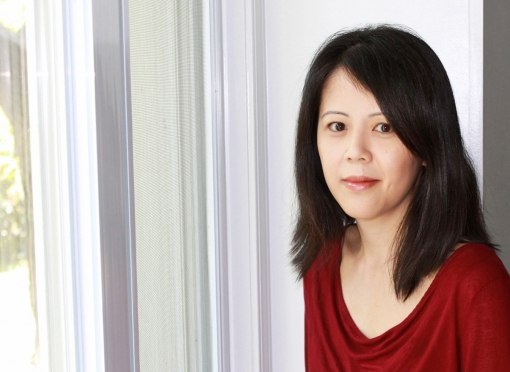When holding a copy of Bich Minh Nguyen's Pioneer Girl, it feels like a copy of a Laura Ingalls Wilder Little House books: thick, with double-spaced sentences and pages that smell wheaty and dusty. For those who read Wilder’s iconic American series, Nguyen's novel will be a familiar and comforting experience. Nguyen provides a fictional account of the cross-temporal relationship between the protagonist, Lee Lien, and Rose Wilder, Laura Ingalls Wilder's daughter and supposed ghostwriter. The two women do not know each other nor do they live in the same time period--they are connected only through a single piece of gold jewelry. Nguyen cultivates romantic notions of “the west” (California to be exact) and weaves a story that is both mystery and a powerful sociocultural narrative on the Asian American experience.
We first meet Lee Lien, a young woman who recently earned her Ph.D. in American Literature, trying to figure her next career move. Unable to land a permanent teaching gig or fellowship, she moves back home to La Porte, Illinois to live with her mom and grandfather, who run a Vietnamese restaurant called Lotus Leaf. Lee is unhappy by the move back home. According to her mother, Lee was never quite on the “right” career path: “My mother once said that everything was easier before Sam [her brother] and I came along. Came along, as though we'd had a say in the matter. What she really meant, though, was me.” Lee's father died when she was a young girl, leaving her mother to take care of her father, two children, and run a busy restaurant. Also, there are expectations that Lee will stay at home until she gets married, while her brother experiences more freedom in his life choices.
For most of Lee's youth, her family moved throughout the Midwest, opening up new pan-Asian cuisine buffets in small towns:
Interchangably waiters, busboys, cooks—my parents ran the place in tandem. They weren't Chinese, and neither had any training as a chef. But it didn't matter because the customers didn't know the difference...I [started] busing tables, and saw that buffets in other towns and states followed the same structure, the same skewed ratio of fried to non-fried.
Nguyen captures is the culture of the American buffets, how the pan-Asian buffets feed pan-Asian stereotypes. As Lee and her family moved from town to town opening new buffets, the nomadic lifestyle also fostered a restlessness. Lee's connection to Rose Wilder mirrors this sense: though Rose did not grow up with the struggles of being a hyphenated-American, she did feel the urgency of moving and never being settled. So—the piece of jewelry.
Ong Hai, Lee's grandfather, met Rose Wilder when she was visiting Vietnam in the 1960s, on assignment for a feature article about the country during the war. Rose became friendly with Ong Hai, whose family who operated a small cafe. One day, Rose visited Ong Hai and his family and left a gold pin behind. They never saw her after that. The pin depicted a small house in a field, and the family held on to that pin, even after escaping Vietnam to come to the United States.

The author, Bich Minh Nguyen (www.bichminhnguyen.com)
Lee had not known about the pin until she returned home to La Porte, Illinois. She acquires the pin after her brother Sam ransacked their mother's drawer to find jewelry and money to pay for an escape out to the West; however, she has no idea that this could be Rose's pin. Lee only discovers this possible origin of the pin when she revisits the Little House books. She read them growing up, and related to the Wilders’ state by state moves. She does not tell her mother that her jewelry and privately-hidden cash are gone with Sam, and she does not tell her that she has the pin in her possession. Here, Lee describes the significance of Rose Wilder, the Little House books, and the pin:
So much immigrant desire in this country could be summed up, quite literally, in gold: as shining as the pin Rose had left behind. A promise taken up, held on to for decades, even while Sam and I were reckless with our own history, searching for things we couldn't yet name. If this Rose was the same Rose of the Little House books, the daughter of Laura Ingalls Wilder, then she had defined a part of American desire that my mother understood just as well.
It is clear Nguyen has done her research about Rose and Laura Ingalls Wilder. In fact, she makes Lee her researcher on a mission to find out if the gold pin is indeed Rose's pin. It is easy for readers to envision Nguyen as Lee, asking questions: Who was Rose? Why did she go to Vietnam? Did she in fact know Ong Hai? What can Rose tell me about my family's life in Vietnam? And, does she have descendants? What follows is a journey west. Lee seeks to find her answers throughout the Midwest and in California with the help of college friends and strangers.
Thankfully, the novel does not end with solid answers. For me, the novel provokes imagined conversations between Lee and Rose, discussing what happens in their lives next and empathizing with each other’s sense of restlessness and uncertainty. As Lee says, “I will never feel ready for anything. I will start driving because I have to … toward the prairies, and the hoped-for landscape that always lies just beyond to the west.”
-
Andrea Kim Taylor is a museum educator and works/lives in the Washington DC Metro Area.









Comments